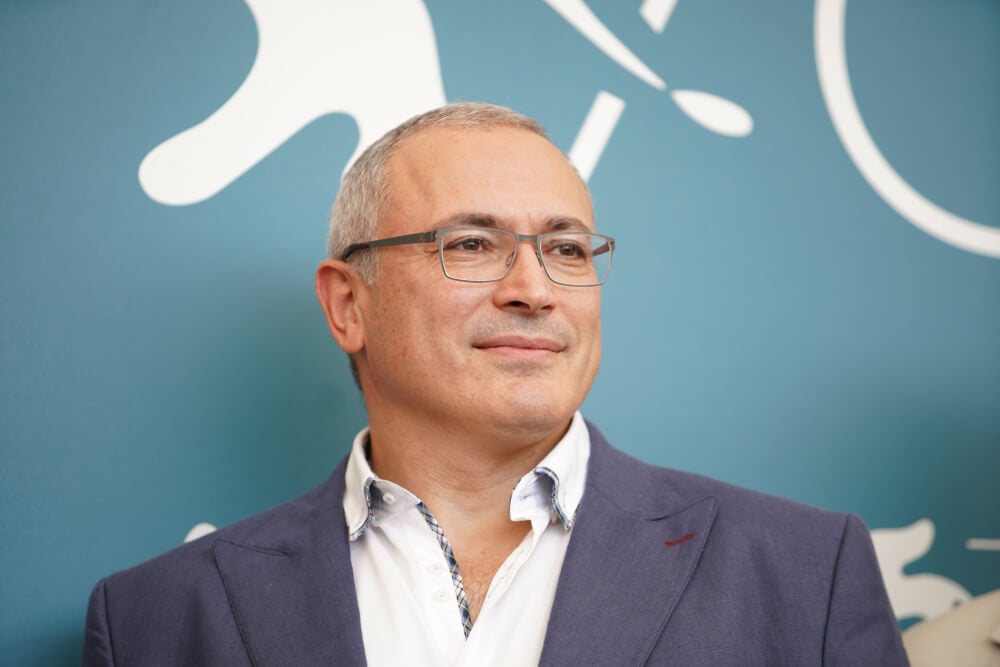If someone claims to belong to the Russian opposition but narrows their views down to Putin's regime, this opposition representative should at least be regarded as unreliable.
Or worse, as part of a package of various proxy oppositionists to Putin that the Kremlin has scattered across the West to confuse Western actors.
The latest conflict between opposition actors, who have opposed Putin's rule in various forms for a long period of time, raised the question of the real motives of their fight—whether some of them want a real change in Russia or whether their opposition engagement is part of some other scenario.
The late opposition leader Alexei Navalny founded the Anti-Corruption Foundation (FBK), which accused the oligarch and major critic of Putin, Leonid Nevzlin, of being behind the attack on their former chairman Leonid Volkov earlier this year in Lithuania.
The FBK organisation has gained a reputation for its extremely harsh accusations against the corruption of Putin's regime, often covered in documentaries.
Turmoil in the opposition front
In a new video, Maria Pevchikh, head of the FBK investigative team, accused Leonid Nevzlin, as well as his former friend and partner, convicted and exiled businessman Mikhail Khodorkovsky, of the attack and attempted kidnapping of opposition activist Volkov in order to transfer him to Russia and hand him over to the authorities.
Turmoil in Russia's opposition front has fuelled dilemmas over whether FBK is just a wandering fighter who has lost its leader or whether something much more disturbing is lurking in the background.
While accusing Leonid Nevzlin of an attack on Volkov, Maria Pevchikh repeated and made a reference to official charges in Russia against Leonid Nevzlin
It was specifically troubling that while accusing Leonid Nevzlin of an attack on Volkov, Maria Pevchikh repeated and made a reference to official charges in Russia against Leonid Nevzlin.
However, there is no doubt that both Nevzlin and his former friend and partner Khodorkovsky were victims of a politically motivated process by which Putin's regime wanted to take over the country's largest private oil company, Yukos. In the end, he was successful.
Vladimir Putin essentially acquired indirect ownership of the Yukos oil company. Therefore, no one, including the FBK, can state that charges in Russia against Mikhail Khodorkovsky and Leonid Nevzlin were legitimate.
Russophobia as a weapon
Maria Pevchikh made another very troubling and alarming statement about Leonid Nevzlin, accusing him of Russophobia, which clearly echoed Kremlin's propaganda.
Anyone who disputes and objects to Russia's current imperial expansion and aggression against Ukraine, as well as its ongoing attempts to rewrite history, is a Russophobe, according to the Kremlin.
Most of the so-called Russian systemic opposition representatives are occasionally criticising Putin but protecting Russia
Pevchikh specifically listed Leonid Nevzlin's various pro-Ukrainian publications and emphasised the slang term he used, which is very common in Ukraine, to describe Russian invaders.
Most of the so-called Russian systemic opposition representatives are occasionally criticising Putin but protecting Russia.
They avoid saying that starting the war was wrong or promoting the narrative about the need to stop it (which is something the Kremlin also wants to do).
Money is decisive
Leonid Nevzlin clearly rejects the current Russia, its aggression against Ukraine, and internal repression. Therefore, Maria Pevchikh's point about Russophobia raises questions about who has been influencing the FBK since Alexei Navalny's death.
Maria Pevchikh possesses the intelligence to understand that a genuine Russian opposition requires individuals such as Leonid Nevzlin and Mikhail Khodorkovsky. Determining the true motives and reasoning behind the accusations made against Leonid Nevzlin by the FBK is difficult.
 The Russian opposition needs a large amount of cash to defeat Vladimir Putin and the system he has created - Mikhail Khodorkovsky
The Russian opposition needs a large amount of cash to defeat Vladimir Putin and the system he has created - Mikhail Khodorkovsky
Ideology or investigations cannot impact Putin's regime. The Russian people watched investigations by the FBK for a decade, but nothing happened to Putin's regime. Moreover, it got stronger over the years.
The Russian opposition needs a large amount of cash to defeat Vladimir Putin and the system he has created.
In comparison to those who are involved in anti-Putin indoctrination and propaganda, Putin's critics who have substantial financial capabilities, such as Nevzlin and Khodorkovsky, can be far more effective and capable of destabilising Russia and Putin's regime.